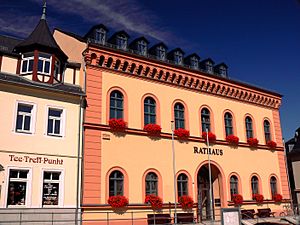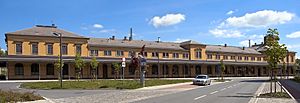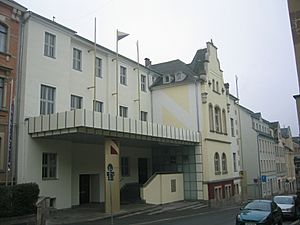Reichenbach im Vogtland facts for kids
Quick facts for kids
Reichenbach im Vogtland
|
||
|---|---|---|
|
||
| Country | Germany | |
| State | Saxony | |
| Admin. region | Chemnitz | |
| District | Vogtlandkreis | |
| Elevation | 380 m (1,250 ft) | |
| Population
(2009-12-31)
|
||
| • Total | 20,449 | |
| Time zone | CET/CEST (UTC+1/+2) | |
| Postal codes |
08468
|
|
| Dialling codes | 03765 | |
| Vehicle registration | V | |
| Website | www.reichenbach-vogtland.de | |
Reichenbach im Vogtland is a town in Saxony, Germany. It is located in the Vogtlandkreis area. With over 20,000 people, it is the second largest town in Vogtlandkreis, after Plauen. Reichenbach is found near the A72 highway, about 18 kilometers from Plauen and 19 kilometers from Zwickau.
Contents
History of Reichenbach
How Reichenbach Started
Reichenbach im Vogtland began as a settlement built by the Franks. It grew quickly because it was in a good spot in a valley, close to Mylau Castle. In 1212, it was officially called Richenbach. This name might come from the many small streams (Bächen in German) that were once in the area where the old town now stands.
Around 1240, Reichenbach was given special town privileges. This meant it had rights to protect itself, trade, and choose its own leaders. In 1271, it was called "civitatis richenbach," showing it was a recognized small city.
Fires and Growth
Sadly, much of Reichenbach's early history was lost in big city fires. These fires happened in 1720, 1773, and 1833. Even so, the foundations of the Peter Paul parish church still date back to the 12th century.
The town grew a lot during the time of industrialization. This was again thanks to its easy access. At first, sewing and weaving were the main jobs in Reichenbach. Later, in the 1800s, the metalworking industry came to the city. In the early 1900s, paper making and printing also became important.
Many famous buildings in Reichenbach were built during this time. These include the Rathaus (city hall) from 1837–1839, the railway station from 1846, and the Göltzsch Viaduct. The Göltzsch Viaduct is the world's largest brick bridge, built between 1846 and 1851.
Reichenbach After World War II
Reichenbach im Vogtland did not play a very big role in World War II. However, on March 21, 1945, American planes bombed the town. This attack killed 161 people and damaged many buildings.
On April 17, the mayor, Dr. Otto Schreiber, decided to surrender the city without a fight. He did this even though the National Socialists had ordered him not to. American troops then took control of the town. On July 1, they handed control over to the Red Army. About 120 young people, aged 15 and 16, were taken by the Soviet secret service (which later became the KGB). This was done hoping that other citizens would be spared.
After Germany was divided, Reichenbach im Vogtland became part of East Germany. Since then, the number of people living in the town has gone down. It dropped from almost 35,000 to just over 20,000 today. When Germany reunited in 1991, many workers in former East German industrial cities like Reichenbach lost their jobs. This caused many people to move away. Since then, many efforts have been made to help the local economy grow again. Reichenbach still has many old industrial buildings that are historically important, but they are not always used today.
Town Expansion
The area of Reichenbach has grown over time. Since the early 1900s, it has added several nearby villages and quarters. These include Brunn (1994), Cunsdorf (1924), Friesen (1994), Mylau (2016), Obermylau (2016), Oberreichenbach (1908), Rotschau (1996), and Schneidenbach (1999). Reichenbach has also worked closely with Heinsdorfergrund since 2000.
Places to See in Reichenbach
- The Reichenbach station is part of the Leipzig–Hof railway line. This line features the Göltzsch Viaduct, which is the largest brick bridge in the world. It is located about 4 kilometers (2.5 miles) west of the town.
- The Neuberinhaus is a museum and theatre. It is named after the town's most famous person, actress Friederike Caroline Neuber (1697–1760). She was known as "the Neuberin." The museum has exhibits about her life, 18th-century German theatre, and the town's history.
- The Park der Generationen (Park of Generations) are gardens that were created for the 5th Saxon Landesgartenschau (a big garden show). This show took place from May 1 to October 18, 2009.
Images for kids
See also
 In Spanish: Reichenbach im Vogtland para niños
In Spanish: Reichenbach im Vogtland para niños
 | Stephanie Wilson |
 | Charles Bolden |
 | Ronald McNair |
 | Frederick D. Gregory |









